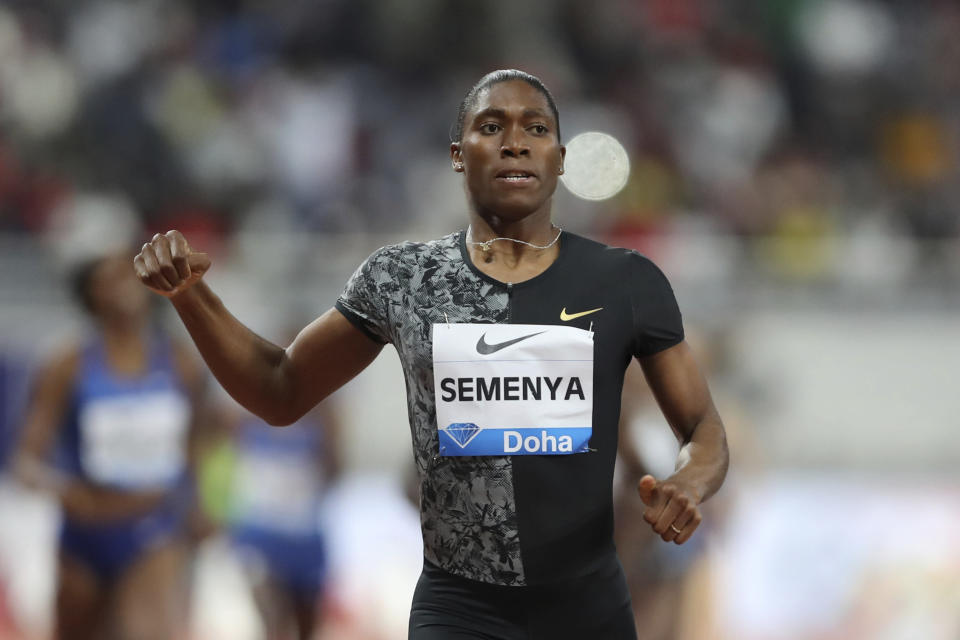South Africa will appeal Caster Semenya ruling on grounds judges were 'conflicted', facts ignored

The South African track federation plans to appeal the Court of Arbitration for Sport’s (CAS) landmark decision regarding testosterone levels in competition on behalf of Caster Semenya, the country’s middle-distance Olympic gold medalist.
Athletics South Africa (ASA) reportedly informed the country’s sport ministry it made the decision to appeal, according to the Associated Press. ASA took the IAAF to court alongside Semenya. The CAS ruled, 2-1, that women with “differences of sex development” and higher levels of testosterone must medically lower them to compete.
The sports ministry will allegedly also take the case to the United Nations General Assembly, per AP, to “to sanction the IAAF for violating international human rights instruments.”
South Africa: 2 judges ‘conflicted’
The country will appeal on three grounds, per the Associated Press.
The South African sports ministry said in a statement, per the AP, that two of the three judges were “conflicted.” They sat on a case involving testosterone regulations in 2015 involving Indian sprinter Dutee Chand and decided to suspend the IAAF regulations for two years.
Chand and Semenya both were born with hyperandrogenism, a condition that produces naturally occurring higher testosterone levels. (Neither are transgender athletes, a falsehood that has circulated since the ruling.)
Chand, an under-18 100m champion for Indian, won her case after being forced to miss the Commonwealth and Asian Games due to the ban.
The two-year suspension put in place by the CAS eventually expired and the new regulations put into place by the IAAF covered distances between 400m and one mile. The organization said it had data showing an advantage for hyperandrogenous athletes in those distances.
Chand, 23, competes in the 100m and 200m so she is omitted from the regulations. When the rules went back into effect in 2018 she offered her legal team to Semenya.
Semenya, 28, competed in the final event without a testosterone limit this month. She said “hell no” to taking hormones to suppress testosterone in order to be allowed to continue competing.
Appeal alleges CAS ignored scientific evidence
The organization alleges “the facts before the court and the outcome do not match,” per the AP. It is arguing the evidence presented by lawyers in support of Semenya was scientifically and medically sound, but the CAS did not heed it.
CAS alluded to this in part and asked the IAAF to not implement testosterone levels for the 1,500m until it delivered more sound evidence. The IAAF went ahead and did it anyway.
Semenya’s case is based in part that there is no evidence higher testosterone is beneficial. The IAAF data that insists higher testosterone is a benefit has been called flawed by some scientists.
Finally, the sports ministry said the decision didn’t cover the legal aspect and how the IAAF would then put the rules into place.
“The pertinent legal questions that the court should have addressed were not addressed,” the South African sports ministry said. “The court simply gave the unfettered latitude to the IAAF to do as it pleases.”
The rules are viewed as targeting Semenya, who won two Olympic golds in the 800m.
Appeals include look at public policy
Parties can appeal based lacking jurisdiction, a violation of rules, or a decision that is incompatible with public policy. It must be made by May 31 and would be heard by the Swiss Federal Tribunal.
At the time of the ruling, the World Medical Association (WMA) reissued a note that advised physicians to “take no part in implementing” the regulations for classifying female athletes.
President Dr. Leonid Eidelman noted questions about the ethical validity and the level of evidence in the WMA statement.
The case has again opened up social conversation including who counts as a woman, how or even why certain athletic competitions are divided on gender lines and the role of science in dividing people along gender and sex lines.
More from Yahoo Sports:


